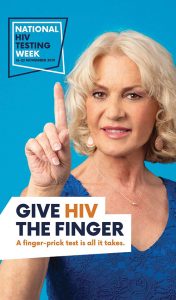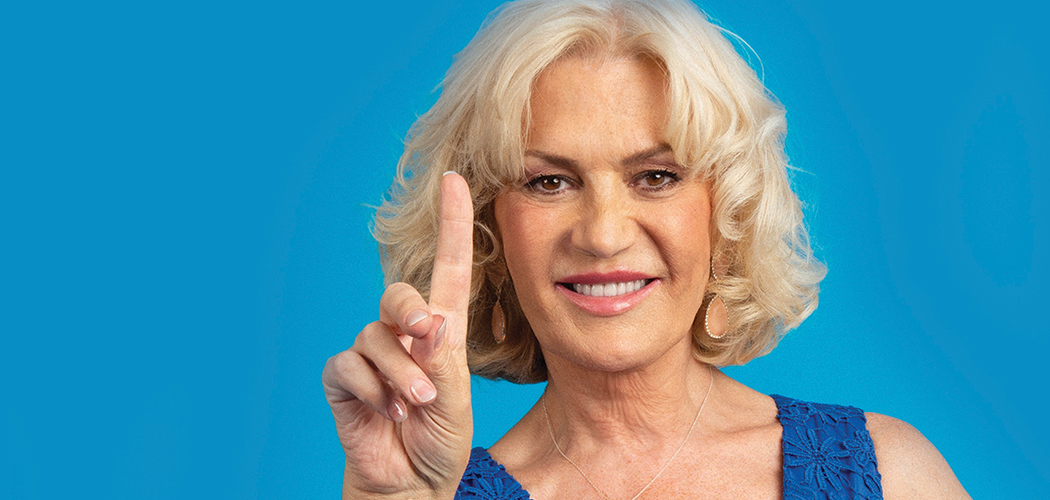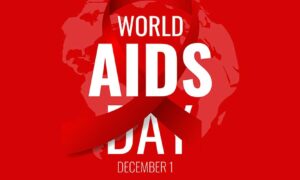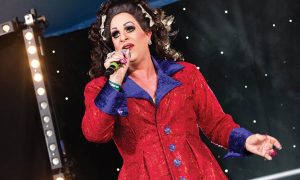Rebecca de Havilland has been living with HIV since the mid-1980s, including near-death experiences when she took herself off medication and sunk into drug addiction. David Hudson heard her remarkable story.
When Rebecca de Havilland was told she was HIV positive in March 1987, doctors warned her she could expect to live a couple of years. There was no effective treatment for HIV at that time.
“My whole world just stood still and changed forever,” she recalls.
Rebecca, 61, was born in County Longford, Ireland, and raised in Dublin. She carved herself a very successful career as a hair and makeup artist in the 1980s. Raised as a boy, she thought she may be gay for a while until she realised that she was transgender. She began to transition, but to undergo gender reassignment surgery at that time, she had to first have a blood test. This was when she discovered her HIV status.
“I was at the top of my career so I couldn’t let anyone know I had AIDS. The only way I can describe AIDS then is probably how people treat Ebola today. They thought if you could breathe on them you could catch it. It was devastating.”
Rebecca kept her status a secret. By the arrival of the 1990s, she was amazed to find herself still alive but had started to drink heavily and take drugs. She decided to tell her family – that she was HIV and planned to undergo gender reassignment.
“It drove people even further away from me because it was a double whammy. I came from Catholic Ireland and was having a sex change and I had AIDS.”
Rebecca said her family continued to talk to her, but they struggled with the information. She’d visit them and be given the same plate and mug. People were scared she’d pass on HIV.
In 1991, after saving her own money, she had her longed-for surgery. She says she had counselling in the run-up to the procedure, but being allowed home from hospital after ten days, she found little support and felt more alone than ever.
By this stage, Rebecca was living in London. Her substance abuse spiralled. She began selling herself on street corners to pay for heroin and crack cocaine. The new HIV medication that arrived in the mid-90s brought her virus under control, but it did little to treat the stigma towards HIV. She went into denial about her status. By 2007, her life reached a crisis point.
“It got so bad I tried to take my own life. I found myself on a life-support machine in Chelsea and Westminster hospital. Then I was sectioned for 72 hours in a mental institution. That was my rock bottom. From that day to this, I’ve been clean and sober.”
In 2009 she returned to Ireland for what she thought would be a brief visit. An old friend offered her a job in his new cabaret club. Not only was the money good, but Rebecca – in a bizarre twist of fate – reconnected with the daughter she’d lost contact with 27 years before. She happened to be working in the same club!
In 2010, she published a memoir, His Name Is Rebecca, which sold well. The only life detail left out was her HIV status. She still feared the stigma attached to the virus.
Moving back to Ireland meant Rebecca ran out of her medication. Undetectable, she wrongly thought she’d be OK: “I thought ‘I’m undetectable, I’ll survive.’ By 2011, people were saying to me, ‘You’re losing loads of weight.’ My teeth were rotting. My hair was thinning. Psychologically, at the back of my mind, I knew but I was in denial.
“So by the time 2013 came, I was a skeleton. I went to see my GP and he told me I had pneumonia. And then I told him I had HIV, and he jumped back because he’d never dealt with anything like it.”

Rebecca realised that if she wanted to live, she had to get back to London and the care of HIV experts. So she did, eventually becoming undetectable again after 18 months. She has since become the poster girl – literally – for knowing one’s status and taking care of one’s self. Not only has she graced a Terrence Higgins Trust campaign, but she went into schools to talk about living with HIV. This led to her publicly disclosing her status on Facebook.
She’s now project managing the 56T service for trans and non-binary people at 56 Dean Street and runs her own Project Boot Camp for trans women. It offers support along every step of the transition process and beyond. It covers health and wellbeing, HIV testing and PrEP – which some trans people are worried about taking under the mistaken belief it will interfere with their hormone therapy. They also get advice about hair, makeup, relationships, and careers.
“I’ve been everything that they don’t need to be,” says Rebecca. “I suppose that’s what makes me good for the job.”
Although she says there is still too much stigma around the virus, Rebecca has found a purpose in life.
“I’m 61 and I couldn’t be happier. I’m undetectable. I live in a lovely flat in Chelsea with my two dogs. When I say life couldn’t be better, it really couldn’t! I’ve not been given a second chance, but a third chance. And what I’m doing now, I’m doing from my heart. I’m doing it because I just want to help prevent other people from having to do half the journey I have.”
56T at 55 Dean Street runs every Wednesday evening. Check dean.st/cliniq for details.
Follow Rebecca on Twitter: @bexdehavilland














